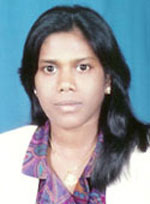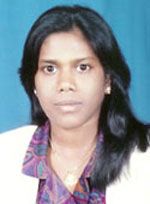


Dr Valsamma Eapen was born in India. She graduated in medicine from T.D Medical College, Kerala University, and received a Diploma in Psychological Medicine from the National Institute of Mental Health and Neurosciences, Bangalore, India.
She received her PhD from the University of London. Dr Eapen started her academic career as a Lecturer in Psychiatry at the University College London Medical School and then moved to the Faculty of Medicine and Health Sciences, UAE University in October1994 as Assistant Professor and Consultant Child Psychiatrist (Tawam and Al Ain Hospitals). She was promoted to the rank of Associate Professor in June 1998. As a clinician Dr made important contributions to the mental health services in the country, including the initiation of a School Mental Health Screening Program. In recognition of these contributions, she was awarded the Distinguished Performance in University and Community Services Award in 2003.
Dr Eapen is a member of 7 professional bodies, has published over 70 scientific papers, has authored around 10 book chapters and contributed to 40 conference proceedings.
Valsa's award winning paper published in the EMJ is an epidemiological study of developmental and behavioral disorders in three-year-old children of the UAE. It was funded by Sheikh Hamdan Award for Medical Sciences.
To date, no studies have been carried out in the Middle East including the UAE, to establish the rates of occurrence of developmental and behavioral problems in pre- school children. However, this information is crucial in the planning and development of child health services for young children in this country. The present study was therefore undertaken to ascertain the prevalence and nature of developmental disorders (global developmental delay or mental retardation; specific speech and language disorders, pervasive developmental disorders or the autistic spectrum of disorders).
From a representative random sample of 2000 households, 694 households with 3 year old UAE national children were studied using a two stage epidemiological study design In Al Ain, Dubai and Ras AI~Khaimah. Of the 694 children studied in stage I, 351 were males and 343 were females. The mean age of the sample was 3 years and 7 months. Using the Denvor Developmental Screening Test (DDST), 8.4% were found to have a global developmental delay and 9.9% had developmental language delay. On Autism Screening Questionnaire, 0.58% was found to have significant autistic features. 10.5% of children were found to have behavioral problems as per the Achenbach Child Behavior Check List (CBCL). None of the children with developmental delays or behavioral problems had been previously recognized or diagnosed to have such problems.
The study observed an association between the presence of developmental delay and the occurrence of behavioral problems. Stepwise logistic regression analysis indicated that the factors that significantly increased the odds of having a global developmental delay were a positive family history of developmental problems, pregnancy complications, major traumatic life events in the family and poor maternal education. Presence of behavioral problems was found to be associated with urban living, complications during pregnancy and difficult obstetric history, presence of chronic physical illness, family history of psychiatric illness, and social disadvantage as indicated by parental loss, poor quality of parental marriage, involvement of domestic help in child care, traumatic/major life event, and psychosocial stress in the family. Developmental language delay on the other hand was associated with rural living, neonatal problems, a different (non-UAE) nationality of the mother, and family history of developmental language problems. The findings reported in this paper reveal that developmental and behavioral problems are often not recognized or diagnosed in the early childhood, thus missing the opportunities for early intervention. This has significant implications for the planning of child health services in the country, and suggests that there is an urgent need for the introduction of effective screening and early intervention services for children with developmental problems.
Dr. Valsamma Eapen is awarded for her original article published in the Emirates Medical Journal from inside UAE for the year 2003-2004